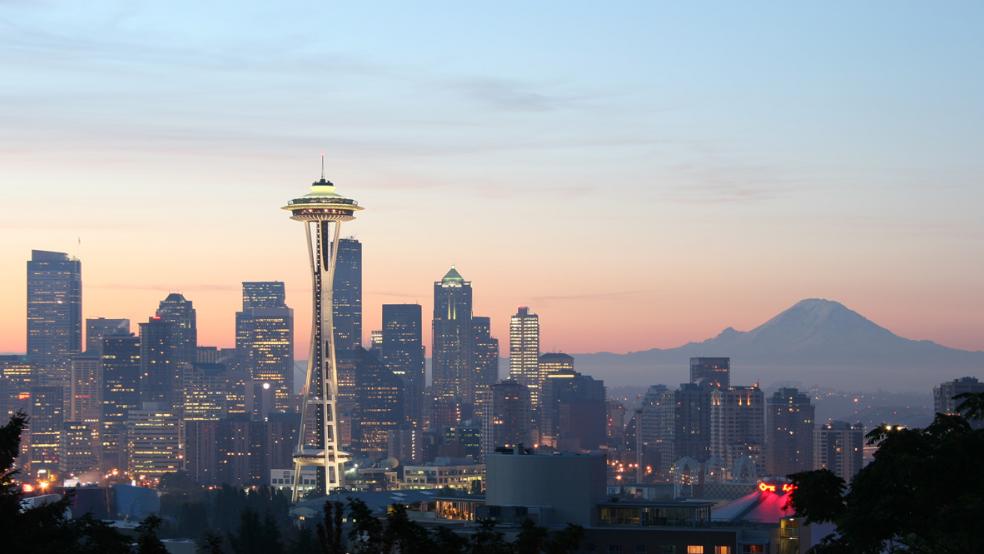From minimum wage hikes to bans on plastic bags, fierce city-state clashes are erupting in places where educated millennials make up a much larger percentage of the urban population than they do in the state as a whole.
In cities such as Atlanta, Seattle and Madison, the share of college graduates younger than 35 is roughly three times that of the state at large, according to a new Stateline analysis of census data. (The figures are for the voting-age population in each city and state.)
Related: The 10 Best Cities for Middle-Class Families
Overall, there are 20 large cities (more than 200,000 residents) in 16 states where the percentage of educated millennials is at least twice that of the state. They range from Cincinnati, where the respective percentages are 12.1 percent, compared to 6.2 percent for Ohio as a whole, to Madison, where the split is 20 percent to Wisconsin’s 6.5 percent. Other cities on the list include Columbus, Ohio; Minneapolis; Nashville, Tennessee; Orlando, Florida; Pittsburgh; and Portland, Oregon.
The only state with three cities on the list is North Carolina, where Durham (16.5), Raleigh (14.7) and Charlotte (12.5) all have educated millennial populations that are at least twice as large as the state’s 6.3 percentage. North Carolina has become a flashpoint in the city-state debate, attracting national attention in the process.
The most recent flare-up began in February, when the Charlotte City Council approved a law barring businesses from discriminating against gay, lesbian and transgender customers. Its most controversial provision would have allowed transgender residents to use either a men’s or women’s bathroom, depending on the gender with which they identify.
The so-called bathroom law outraged North Carolina lawmakers, who responded by approving a law prohibiting cities and other local governments from establishing their own anti-discrimination rules. The new state law also prevents cities from setting their own minimum wage laws, another frequent bone of contention between cities and states.
Related: The 10 Hardest Working Cities in America
Durham also has run into state resistance. Last year, a last-minute budget amendment endangered its light-rail plans by taking away almost $138 million in promised funding, though Republican Gov. Pat McCrory is negotiating to get it back.
Don Moffitt, a member of Durham’s City Council, sees larger forces at work.
“There are many demographic shifts going on in North Carolina and across the country that worry and anger people in small towns,” Moffitt said. “They see the large urban centers growing and thriving, while populations in small towns are decreasing.”
From minimum wage hikes to bans on plastic bags, fierce city-state clashes are erupting in places where educated millennials make up a much larger percentage of the urban population than they do in the state as a whole.
In cities such as Atlanta, Seattle and Madison, the share of college graduates younger than 35 is roughly three times that of the state at large, according to a new Stateline analysis of census data. (The figures are for the voting-age population in each city and state.)
Related: The 25 Most Livable Cities in the US in 2016
Overall, there are 20 large cities (more than 200,000 residents) in 16 states where the percentage of educated millennials is at least twice that of the state. They range from Cincinnati, where the respective percentages are 12.1 percent, compared to 6.2 percent for Ohio as a whole, to Madison, where the split is 20 percent to Wisconsin’s 6.5 percent. Other cities on the list include Columbus, Ohio; Minneapolis; Nashville, Tennessee; Orlando, Florida; Pittsburgh; and Portland, Oregon.
The only state with three cities on the list is North Carolina, where Durham (16.5), Raleigh (14.7) and Charlotte (12.5) all have educated millennial populations that are at least twice as large as the state’s 6.3 percentage. North Carolina has become a flashpoint in the city-state debate, attracting national attention in the process.
The most recent flare-up began in February, when the Charlotte City Council approved a law barring businesses from discriminating against gay, lesbian and transgender customers. Its most controversial provision would have allowed transgender residents to use either a men’s or women’s bathroom, depending on the gender with which they identify.
The so-called bathroom law outraged North Carolina lawmakers, who responded by approving a law prohibiting cities and other local governments from establishing their own anti-discrimination rules. The new state law also prevents cities from setting their own minimum wage laws, another frequent bone of contention between cities and states.
Durham also has run into state resistance. Last year, a last-minute budget amendment endangered its light-rail plans by taking away almost $138 million in promised funding, though Republican Gov. Pat McCrory is negotiating to get it back.
Don Moffitt, a member of Durham’s City Council, sees larger forces at work.
“There are many demographic shifts going on in North Carolina and across the country that worry and anger people in small towns,” Moffitt said. “They see the large urban centers growing and thriving, while populations in small towns are decreasing.”
This article originally appeared on Stateline. Read more from Stateline.
The State of the States on Naturalization: Highlights from California, Illinois, and Washington
More States Weigh Action to Help People Save for Retirement
Tiny Houses Are Affordable, Energy-Efficient and Often Illegal




